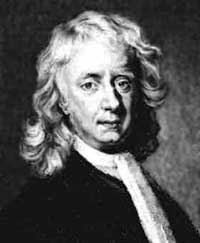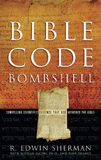| |
|
Isaac Newton, Bible Code Pioneer?
|
 The folly of interpreters has been to foretell times and things by this prophecy, as if God designed to make them prophets. By this rashness they have not only exposed themselves, but brought the prophecy also into contempt. The design of God was much otherwise. He gave this and the prophecies of the Old Testament, not to gratify men's curiosities by enabling them to foreknow things, but that after they were fulfilled they might be interpreted by the event, and his own providence, not the interpreters', be then manifested thereby to the world. For the event of things predicted many ages before will then be a convincing argument that the world is governed by Providence.
The folly of interpreters has been to foretell times and things by this prophecy, as if God designed to make them prophets. By this rashness they have not only exposed themselves, but brought the prophecy also into contempt. The design of God was much otherwise. He gave this and the prophecies of the Old Testament, not to gratify men's curiosities by enabling them to foreknow things, but that after they were fulfilled they might be interpreted by the event, and his own providence, not the interpreters', be then manifested thereby to the world. For the event of things predicted many ages before will then be a convincing argument that the world is governed by Providence.
Sir Isaac Newton (1642-1727)
The following article was featured in the March, 2026, issue of Bible Code Digest.
Throughout The Bible Code, the book that alerted the world to the whole subject, author Michael Drosnin wrote that Sir Isaac Newton, arguably the greatest scientist who ever lived, searched for codes in the Bible.
Born on Christmas day in 1642, the same year that the tragic figure Galileo died, Newton discovered the binomial theorem, the method of fluxions (calculus), the law of gravitation and the composite nature of light�all before the age of 30. The foundations of modern astronomy and physics are still largely based on theories Newton first presented more than 300 years ago.
A humble and reclusive figure, Isaac Newton was a Christian who studied the Bible daily and believed that God created everything, including the Bible. He believed that the Bible was true in every respect. Throughout his life he continually tested biblical truth against the physical truths of experimental and theoretical science and never observed a contradiction, according to his many biographers. Newton's writings reflected his belief that his scientific work was a method by which to reinforce belief in biblical truth. After he completed his monumental Philosophiae Naturalis Principia Mathematica, he began to devote more and more of his time to researching the Bible, eventually writing a book he believed unlocked the prophecies contained in Daniel and Revelation, two Bible books he viewed as intertwined. The great bulk of his writing went unpublished, however, even though according to one writer, Newton believed that a scientist who had the ability to explain the workings of the world and did not explain and share it with mankind, was denying God one form of adoration.
Quoting Keynes
The source Drosnin quoted for his speculations about Newton�s interest in decoding the Bible was a book by another great English mind, economist John Maynard Keynes (pronounced �Canes�), who wrote a very brief biographical chapter on Newton in his book Essays and Sketches in Biography (Meridian Books, New York, 1956).
Actually, in his 11-page treatment on Newton, Keynes did not quite say that Newton worked with Bible codes, but said that he regarded the entire universe (including the Bible) as a �cryptogram.� He wrote about a Newton who his biographers did not know, with opinions based on a large box of unpublished writings and correspondence that Newton left behind at Cambridge University, where he had held the Lucasian Chair of Mathematics for 33 years. He moved on to London in 1699, where he became master of the mint and president of the Royal Society. He died there at the age of 85 in 1727. Two hundred years later, when Keynes became provost of Cambridge, he discovered the box and spent years going over the papers, which he estimated contained more than a million words about Newton�s Bible research.
Keynes believed that Newton�s writings showed him to be rather eccentric in his Christian theology. For example, at a time when the trinity was more or less accepted as fact in theological circles, Newton wrote voluminously to support his belief that the theory was fraudulent. He based his theories completely on his study of the ancient texts (he was fluent in Hebrew, Greek and Latin) and was persuaded that they gave no support to trinitarian doctrines. But he never published these works or announced them publicly, perhaps recalling the fate of Galileo, who stuck to his guns supporting the theory that the solar system revolved around the sun and was hounded by the Vatican for his views until the day he died.
Did Newton Search for Bible Codes?
Here is what Keynes had to say about Newton that might have been construed by Drosnin as implying that he was searching for Bible codes:
. . . (Newton) looked on the whole universe and all that is in it as a riddle, as a secret which could be read by applying pure thought to certain evidence, certain mystic clues which God had laid about the world to allow a sort of philosopher�s treasure hunt to the esoteric brotherhood. He believed that these clues were to be found partly in the evidence of the heavens and in the constitution of elements (and that is what gives the false suggestion of his being an experimental natural philosopher), but also partly in certain papers and traditions handed down by the brethren in an unbroken chain back to the original cryptic revelation in Babylonia. He regarded the universe as a cryptogram set by the Almighty�just as he himself wrapt the discovery of the calculus in a cryptogram when he communicated with Leibnitz. By pure thought, by concentration of mind, the riddle, he believed, would be revealed to the initiate.
He did read the riddle of the heavens. And he believed that by the same powers of his introspective imagination he would read the riddle of the Godhead, the riddle of past and future events divinely fore-ordained, the riddle of the elements and their constitution from an original undifferentiated first matter, the riddle of health and of immortality. All would be revealed to him if only he could persevere to the end, uninterrupted, by himself, no one coming into the room, reading, copying, testing�all by himself, no interruption for God�s sake, no disclosure, no discordant breakings in or criticism, with fear and shrinking as he assailed these half-ordained, half-forbidden things, creeping back into the bosom of the Godhead as into his mother�s womb. �Voyaging through strange seas of thought alone,� not as Charles Lamb, �a fellow who believed nothing unless it was as clear as the three sides of a triangle.�
What if Newton Had Access to a Computer?
Whether Newton actually looked for ELSs in the Hebrew Bible is not known. He may have been aware of medieval searches for codes by some Hebrew scholars and kabbalists. It is mind-blowing to think of the possibilities available to him if he had access to a computer.
To Newton�s mind it was clear that some prophecies would not be understood until the end of history. This is an excerpt from his book on Daniel and Revelation:
This prophecy is called the Revelation, with respect to the Scripture of Truth, which Daniel was commanded to shut up and seal, till the time of the end. Daniel sealed it until the time of the end, and until that time comes, the Lamb is opening the seals: and afterward the two Witnesses prophesy out of it a long time in sackcloth, before they ascend up to heaven in a cloud. All of which is as much as to say, that the prophecies of Daniel and John should not be understood till the time of the end: but that some should prophesy out of it in an afflicted and mournful state for a long time, and that but darkly, so as to convert but few. But in the very end, the Prophecy should be so far interpreted so as to convince many. Then saith Daniel, many shall run to and fro, and knowledge shall be increased.
For the Gospel must first be preached in all nations before the great tribulation, and end of the world. The palm-bearing multitude, which came out of this great tribulation, cannot be innumerable out of all nations unless they be made so by the preaching of the Gospel before it comes. There must be a stone cut of the mountain without hands, before it can fall on the toes of the Image, and become a great mountain and fill the earth. An Angel must fly through the midst of heaven with the everlasting Gospel to preach to all nations, before Babylon falls, and the Son of man reaps his harvest. The two prophets must ascend up to heaven in a cloud, before the kingdoms of this world become the kingdoms of Christ.
'Tis therefore a part of this Prophecy, that it should not be understood before the last age of the world; and therefore it makes for the credit of the Prophecy, that it is not yet understood. But if the last age, the age of opening these things, be now approaching, as by the great success of late Interpreters it seems to be, we have more encouragement than ever to look into these things.
If the general preaching of the Gospel be approaching, it is for us and our posterity that these words mainly belong: In the time of the end the wise shall understand, but none of the wicked shall understand. Blessed is he that readeth, and they that hear the words of this Prophecy, and keep those things that are written therein (Daniel 12:4,10)
How did Newton view his accomplishments in light of his belief in God? Shortly before his death, he wrote, �I do not know what I may appear to the world, but to myself I seem to have been only like a boy, playing on the seashore and diverting myself in now and then finding a smoother pebble or prettier seashell than ordinary, while the great ocean of truth lay all undiscovered before me.�
He was buried in Westminster Abbey, and during a huge state funeral, he was carried to his tomb on the shoulders of the Lord high chancellor, two dukes and three earls, in a day when such rank truly meant something. His monument in the great cathedral had been previously refused to England�s greatest nobility. No such honors were ever paid to a man of science before or since.
NOVA is the highest rated science series on television and the most watched documentary series on public television. NOVA has produced a program about the life of Isaac Newton. It does not cover his interest in Bible codes, but is a fascinating look at his life in other respects. For more information, visit the NOVA Newton page at PBS.org.
|
Enjoy finding your own Bible codes.
Bible code search software is available in our online store.
Subscribe Free!
By signing up to be a member of The Isaac Newton Bible Research Society, you will have access to more than fifteen years of research by our team of Bible code researchers.
Sign up to be a member today.
|
|
Now available, donate using PayPal ↓
 
Bombshell examines two massive, recently discovered clusters of codes in the Hebrew Old Testament. To read more about Bombshell, click here, or click below to order from Amazon today!
 
|





